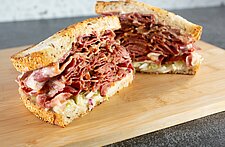Millennials and (Home) Food
- When it comes to food, Millennials are aspirational and knowledgeable, craving experience and authenticity at every turn.
- Millennials expect (and appreciate) quality food products that meet their needs for authenticity, whether those are ready-to-heat products or ingredients for scratch cooking.
- Meals are a reason to gather and cooking is a social event. Eating (and cooking) alone is more utilitarian: it just isn't any fun, even if perfecting skills and growing expertise. Social always trumps the solo, especially in a Millennial kitchen.
- Millennials are native technology users and they also have an expectation that life comes with the tools they want to get what they want just when they want it. This means they are agnostic when it comes to a "best" way to reach them.
- Tech is a tool, one of many they utilize for information. But they still appreciate the in-store experience. A Best Practice example of this is Trader Joe's and its (relatively inexpensive, minimum ingredient) private label brands which have a loyal Millennial following yet the brand does no media advertising of any kind.
Millennials are foodies.
- Are they all Iron Chefs? No. But they are children of Food Channel-like competitive cooking shows, have grown up in a country with diverse tastes, and consider organic and natural as mainstream.
- Millennials appreciate the idea of natural and authentic foods as well as updated experiences: [Think old + new = newer] ie "new" casseroles replacing processed ingredients with fresh ingredients, including vegetables and "contemporary" proteins such as turkey, crab and shrimp; Mac 'n cheeses featuring natural and organic ingredients and other flavor twists. —"Generational Comfort Foods," Center for Culinary Development (CCD) and Packaged Facts 7.09
- It's not always/only healthy, though. Indulgence (high or low) is a sometimes thing.
When it comes to food, two values motivate Millennials: choice and experience.
Choice: Millennials were raised in a world where choice was a given and an expectation at every turn. Flexibility is key. (What do you mean I can't get an Egg McMuffin whenever I want one?) That means they want options— but not just options from a quantity perspective. They are savvy consumers who understand that limited choice works just as well as unlimited choice, so in the food space, they want choices that make sense. That means trusting a chef (or a foodie friend) to recommend the best dishes or trusting their own palates to find what they like.
Experience: Everything in Millennials' lives centers on the idea of experience. Social gatherings, shared moments, interactive engagements— all motivate their behaviors and drive their choices. In the food space, they are looking for the food itself to enhance these experiences. It can be a catalyst or a focal point, but it shouldn't get in the way of what's most important— sharing a moment together with friends and family.
So Who Are They? And does lifestage matter?
Adulthood, Our Way (aka: Choice Life)
We've been saying it for years, and it still holds true: When it comes to "growing up," Millennials are taking a distinct path compared to their predecessors. It's all about options and doing things that make sense for them, not "just because."
Lifestyle Over Lifestage:
Millennials are "growing up"-- becoming partners, parents and professionals. And yet...they seek out opportunities for these new lifestages to FIT INTO their carefully curated lifestyles, not the other way around. That doesn't mean they are delusional about lifestage-- they get that it changes things and that lifestyle will have to adapt. But from their perspective, lifestage should be part, not the entire focus, of their lifestyles.
What does this mean?
Millennials don't take their lifestage shifts lightly-- mainly because, they've made choices about these shifts and are purposeful in the way they approach them.
As a result, they are conscious of the ways that lifestage impacts their lives, but they don't want it to overrule or take over what they've already established.
So, when it comes to food, if they were foodies before, foodies they shall stay, regardless of lifestage shifts. If they loved to cook, they'll find ways to keep doing it. Sure, lifestage has to creep in, but as much as they possibly can, Millennial are about maintaining their lifestyles.
- Millennials are self-expressers and food has always been a way to indulge in this behavior. The kitchen offers endless opportunities for experimentation and discovery, which they thrive on.
- They've learned to cook or at least have a sense of the importance of cooking from their Boomer parents. That said, cooking is a leisurely pursuit for them, and they don't cook as frequently as their Xer and Boomer counterparts.
- Millennials who lack confidence or skills in the kitchen are quick to turn to technology for help. They don't think twice about watching an instructional video on their laptop in the kitchen or pulling up a recipe on their smartphone in the grocery aisle.
- Recessionary times have meant a return to dining in for Millennials who are struggling with a poor job market, student loans, etc. When they can't justify eating out, they try to bring the flavor adventures and shared experiences they would have had at a restaurant to their own homes.
- Convenience foods that offer big flavor can prevent Millennials from cooking -- especially for occasions like weekday dinners. Frozen options from Amy's or Trader Joe's can be staples.
- The greatest need states around meals cooked at home are:
1. Convenience: Is it easy to prepare, heat up and store
2. Cost: Can it feed a crowd cheaply (key to Millennials
3. Freshnes
4. Diversity: Having go-to's that are thrifty is smart, how can the Millenial add zing to the same-old?
Check out Last Month's Symrise-Iconoculture Post HERE
Check out the August Symrise-Iconoculture Post HERE





